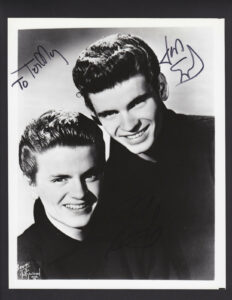By Sharon Oliver
Contributing Writer
BOSTON – In 1957, rock duo the Everly Brothers found themselves under the city’s censorship due to what was considered suggestive lyrics in their hit single “Wake Up Little Susie.” “Banned in Boston” is a term coined and used from the late 19th century through the mid-20th century, to describe literary works, songs, movies or plays which had been prohibited from distribution or exhibition in Boston. The seemingly wholesome teen idol brothers from Tennessee’s song made the infamous list of things that Boston had found unacceptable.

Photo/Wikimedia Commons
Those lyrics about a young high school couple on a date at the movies falling asleep past the girl’s curfew would be viewed as tame in today’s society.
Catholic Church disapproval
However, the Boston Archdiocese did not see it that way. Carrying lots of influence at the time, it ordered all local radio stations to remove the controversial song from the airwaves. The problem with telling anyone not to do something often only increases curiosity and Boston’s banning certainly did not stop the hit record from reaching number one on the Billboard Pop Chart, the Cash Box Best Selling Records chart or spending seven weeks on the Billboard country chart.
The hit song was ranked at No. 318 on the Rolling Stone magazine’s list of “The 500 Greatest Songs of All Time. In 2017, the Everly Brother’s 1957 recording, which was their second number one hit after “Bye Bye Love,” was inducted into the Grammy Hall of Fame.
Culture attitudes shifted significantly between the 1950s and 1980s and the Everly Brothers performed “Wake Up Little Susie” at the Boston Common in 1986. It was the perfect opportunity for the brothers to respond to their previous banishment.
Don Everly recalled the moment in an interview with the Chicago Tribune that same year. “I introduced it by saying, ‘Here’s a song that was banned in this city in 1957.’ Then, we sang it, and it just sounded like a harmless little ditty. How far we’ve come.”
He thought it was a “harmless little ditty” in 1957, too. “I remember when it happened. They called and said it had been banned in Boston. I said, ‘What?’ It’s what people read into it, isn’t it? Today, you say that innocent little song was banned in Boston, and somebody’s going to ask you, ‘Where were people’s heads?’ Phil and I sang pretty much innocent stuff. Our songs were about relationships. Looking back over the lyric content of our music, I’m basically very proud of it. There’s nothing to be ashamed of. There’s nothing sleazy or off-color in there.”
Other Boston bans
To be banned in Boston came with a certain notoriety and attention. The ban extended to the $5 bill from the 1896 “Educational” series of banknotes featuring allegorical figures that were partially nude. Baltimore journalist H. L. Mencken was arrested in Boston in 1926, after purposely selling a banned issue of his magazine The American Mercury. The novel “Strange Fruit,” Lillian Smith’s tale of forbidden interracial romance, was also banned by the Watch and Ward Society (Boston’s vice watchdog organization). In 1961, singer and talk show host Merve Griffin even recorded a novelty song, “Banned in Boston,” which became a modest hit.
Born in Knoxville, Tennessee, the Everly Brothers experienced continued worldwide success throughout the years and eventually sought solo careers due to tensions between the siblings. The brothers reunited for a concert at the Royal Albert Hall in London in 1983. Phil Everly died in 2014 at age 74 and Don Everly passed away in 2021 at age 84.
RELATED CONTENT:
The riot that got Led Zeppelin banned from Boston
Legacy of Alice Brock and ‘Alice’s Restaurant’ lives on
The Bosstown Sound was a short-lived attempt to market local psychedelic rock












